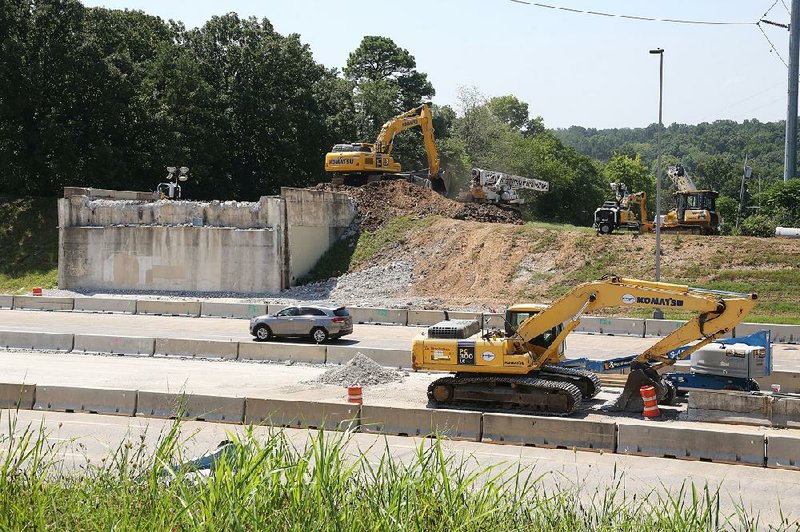Plaintiffs behind an unsuccessful lawsuit seeking to stop an $87.3 million project to widen a section of Interstate 630 in west Little Rock formally said they will appeal the July 27 ruling by U.S. District Judge James Moody Jr.
Five Little Rock residents sued the U.S. Department of Transportation, the Federal Highway Administration and the Arkansas Department of Transportation in July, seeking an injunction to halt construction on the project, which is widening a 2.5-mile section of I-630 between Baptist Health Medical Center and South University Avenue to eight lanes from six.
The lawsuit was filed on July 18, days before work began on the project. The contractor, Manhattan Road & Bridge Co.of Tulsa, already had spent millions of dollars staging equipment and employees to begin work on the project.
The work has included the removal of the Hughes Street overpass. Significant progress has been made on a new overpass.
The entire project is scheduled to be completed in early 2020.
The lawsuit contended that the agencies failed to comply with the National Environmental Policy Act by misclassifying the project to categorically exclude it from more detailed analyses of the project's impact on the environment, such as is required in an environmental assessment or an even more rigorous environmental impact statement.
The plaintiffs particularly found fault with the agencies for not requiring an assessment of the project's impact on air quality. Evidence introduced at a hearing this summer showed that Little Rock's air quality exceeded U.S. Environmental Protection Agency standards.
The state and federal agencies operate under a longstanding agreement in which many projects receive a categorical exclusion, including widening jobs like the I-630 project that don't go beyond property the state agency already owns and maintains.
Moody said the plaintiffs were unable to "demonstrate they will likely suffer irreparable harm if the I-630 project continues," which is the legal standard required to prevail in seeking a preliminary injunction to stop work on a project.
"The Court is aware that a violation of [the National Environmental Policy Act] itself is evidence of a real environmental harm," the judge said. "In this case, however, there has not been a showing that plaintiffs are likely to prove defendants violated NEPA."
A notice of appeal was filed Wednesday with the 8th U.S. Circuit Court of Appeals in St. Louis.
Richard Mays, an attorney for the plaintiffs, said his clients disagree with Moody's interpretation of the evidence laid out in pleadings and a daylong hearing on July 23.
"The way we view the evidence, the evidence did not support the findings and the opinion," he said Thursday.
More broadly, Mays said the appeal presents an opportunity to look at what he says is the overuse of categorical exclusions in major road construction projects.
"The regulations say if there's not any enlargement of the right of way it may apply, but they also have to use some judgment about that, too, in terms of whether the project is of such an enormity, it could cause environmental problems notwithstanding the fact it may be totally done in the right of way," he said.
"Any government agency will use the least amount of effort and the least amount of money on environmental assessment. They consider them a nuisance. They need to be held accountable for these things."
An Arkansas Transportation Department spokesman said agency officials had no comment.
"We don't comment on matters under litigation," Danny Straessle said.
Metro on 09/21/2018
